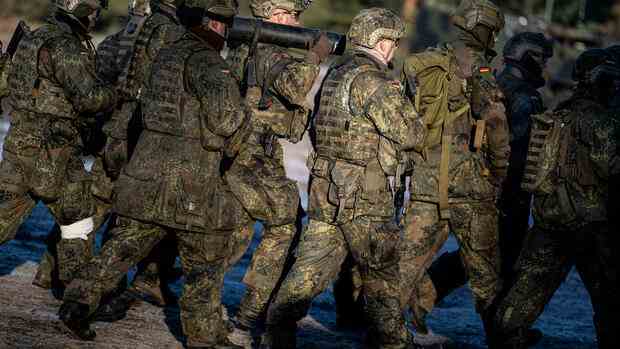Germany has done impressive things in terms of defence, but it’s not enough.
(Photo: dpa)
If someone had told me a year ago that Germany would deliver self-propelled howitzers to Ukraine, I wouldn’t have believed it. Because back then, before the start of the war, the traditional German approach still applied: arms deliveries to crisis areas are taboo; Spending two percent on defense would not be achieved despite the promise to NATO; nuclear participation in NATO controversial; Armament and Bundeswehr unpopular side issues.
And January 2023? The next round of the debate about possible deliveries of tanks to Ukraine begins in Berlin. Yes, debates about tank deliveries – if that isn’t a turning point.
Shortly after the Russian invasion of Ukraine, the German government announced a fundamental change in German defense policy. It was about three areas: the reconstruction of the Bundeswehr, the defense of Europe and support for Ukraine. “Whatever is needed to secure peace in Europe will be done,” promised Chancellor Scholz.
Groundbreaking decisions followed, such as the 100 billion euro special fund for investments in the German armed forces or arms deliveries to Ukraine. All with broad parliamentary and public support.
Top jobs of the day
Find the best jobs now and
be notified by email.
Implementation also began: Berlin supplied the Ukraine with self-propelled howitzers, rocket launchers, anti-aircraft vehicles and much more. Defense spending and investments in the Bundeswehr will increase from around 50 to 59 billion euros in 2023 and thus around 1.7 percent of gross domestic product.
In December 2022, the budget committee approved several procurement projects, including F-35 jets, to secure Germany’s role in NATO’s nuclear sharing. And Germany is increasing its contributions to NATO, such as troops in Lithuania and Slovakia.
The tragedy of the German turning point
This is revolutionary compared to the situation before the Russian war of aggression. But measured against the situation in Ukraine, the growing security policy challenges and the country’s own goals, it’s not enough.
Although Germany is increasing its defense spending, it will not achieve the promised two percent in 2023 or annually thereafter.
(Photo: dpa)
That is the tragedy of the turning point: Germany has achieved impressive things, but it is not enough. Some criticism of Berlin is exaggerated. But Germany itself has raised high expectations with the announcement of the turning point. Unsurprisingly, implementation is now expected, precisely because this government can make a difference for Germany and Europe’s defense.
What is a revolution in Berlin seems to be the minimum for our partners. Germany is supplying weapons, but only some of the material requested by Ukraine: air defense, for example, but no armored personnel carriers.
Deliveries were often late and seemingly under pressure. Industrial stocks have not been used for a long time. The justifications for not supplying certain systems, such as battle tanks, were irritating. Most importantly, there was no long-term plan for military and industrial support for Ukraine.
>> Read here: Breakdowns at the Puma – The chancellor is a little closer to breaking his word
Although Germany is increasing its defense spending, it will not achieve the promised two percent in 2023 or annually thereafter. Instead, the government freezes the defense budget at current levels. There is no financial plan for increasing the defense budget in the long term. The current increase was only possible thanks to the special fund.
As soon as that is issued, the question arises again as to how Germany intends to fulfill its NATO commitment and that of the chancellor and to finance the Bundeswehr. The 100 billion allow to fill the biggest gaps. They do not cover running costs, logistics, repairs and higher training costs. And at the NATO summit in 2023, the Allies could decide on even higher commitments.
Claudia Major heads the Security Policy research group of the Stiftung Wissenschaft und Politik (SWP). She is a member of the Advisory Board on Civilian Crisis Prevention and Peacebuilding at the Federal Foreign Office.
(Photo: Klawe Rzeczy, Getty, PR)
The reform of the Bundeswehr is also paralyzing. A coherent armaments policy that connects industry, the Bundeswehr and politics in Germany, Europe and NATO is missing. The operational readiness of the troops is not guaranteed, as the problems with the Puma infantry fighting vehicle show. After ten months, this is not surprising: reforms take time. What is surprising, however, is that there does not seem to be a systematic plan to remedy the situation.
>> Read here: From sleazeball to beacon of hope – the armaments industry is experiencing a renaissance
Three strands of action are now needed for a long-term successful change of era: a strategy coordinated with partners to provide Ukraine with systematic military and civilian support; a concept for the structural reorganization of the Bundeswehr and comprehensible committed communication why Germany has to reinterpret its role in the world. So why is a turning point necessary?
The author heads the security policy research group of the Stiftung Wissenschaft und Politik (SWP). She is a member of the Advisory Board on Civilian Crisis Prevention and Peacebuilding at the Federal Foreign Office.
More: Should NATO’s two percent target become mandatory? New endurance test for Stoltenberg
